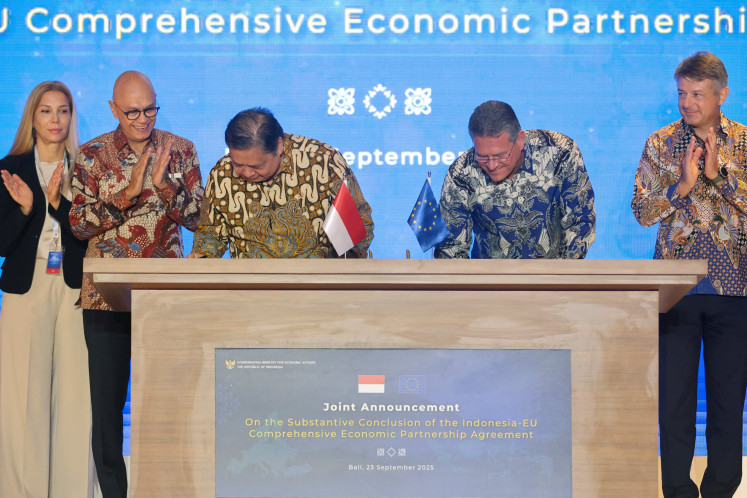Popular Reads
Top Results
Can't find what you're looking for?
View all search resultsPopular Reads
Top Results
Can't find what you're looking for?
View all search resultsNudging or regulating?
Do people make decisions in a rational way? Conventional economics will answer this question with a big “Yes!” As rational beings, humans make choices to maximize their welfare
Change text size
Gift Premium Articles
to Anyone
D
o people make decisions in a rational way? Conventional economics will answer this question with a big “Yes!” As rational beings, humans make choices to maximize their welfare. Nonetheless, it does not always happen even in clear circumstances.
For instance, everybody knows that smoking cigarettes, drinking too much alcohol and eating junk food is not good for our health, but many people still consume them.
How to intervene and persuade humans to decide on better choices? The old-fashioned way is by implementing laws or regulations that are associated with coercion. Recently, “nudging” is emerging as a better way to present citizens with choices, so they can choose the right decision voluntarily without coercion.
The “nudge” theory is drawn from behavioral economics, which scrutinizes how people make decisions. After the publication of Nudge: Improving Decisions about Health, Wealth and Happiness by Richard H. Thaler and Cass R. Sunstein in 2008, the nudge theory has been widely practiced.
To be effective, a nudge policy requires substantially neutral options where people should be at liberty to ignore a nudge if they so wish. As a stealth persuasion the policy should influence the automatic-reflexive reactions of individuals and not rely on overt persuasion.
In addition, to maintain sustainability and efficiency, it ought to avoid financial incentive or minor economic costs. An example can be seen as subconscious cues such as painting targets in urinals to improve accuracy and attempts to make people dispose of waste in proper places.
Nudges have been implemented in many developed countries such as the UK. One example is the use of reminder text messages to reduce missed hospital appointments.
In developing countries, for instance in Moldova, internet video call consultations between doctors and tuberculosis (TB) patients has improved TB medical adherence in that country.
Indonesia must consider this new strategy to shape public policy for three reasons. First, regulation does not assure obedience from citizens. Law enforcement is weak, such as our rules about garbage.
Better to take inspiration from Copenhagen’s streets, for example, where painted green footsteps leading to litter bins are made to encourage people to dispose of rubbish in the right place. Despite no display of rules, these signs reportedly helped to reduce littering by 46 percent.
Second, establishing regulations are costly in resources and time and sometimes they carry political bias. To make one regulation, the legislature or executive agencies need huge amounts of funds, studies, academic papers, consultations, legal drafts and other administrative expenses. Nudging is not only more efficient, but also encourages the government to act innovatively.
Third, in line with democracy and human rights, people’s dignity needs to be appreciated. Coercion and paternalistic forms of government are now heavily criticized. Nudge offers soft persuasion called “soft paternalism” in which people are acting voluntarily based on their informed knowledge of particular circumstances.
Of course, not all human behavior can be influenced by such nudging. “Nudge policies” will not replace regulations. Indeed, there is no silver bullet in managing public affairs. Governments should know when to use nudging, when to use regulation and when to combine both of them. Administrators need to understand context, while stimulating innovation among government institutions.
___________________________________
The writer is a Chevening scholar, studying for a Master’s degree in public administration, University of Exeter, UK.










